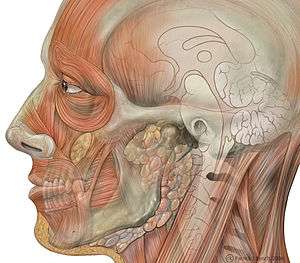Facial toning
Facial toning, or facial exercise is a type of cosmetic procedure or physical therapy tool which promises to alter facial contours by means of increasing muscle tone, and facial volume by promoting muscular hypertrophy, and preventing muscle loss due to aging or facial paralysis. Facial toning and exercise is therefore in part a technique to achieve facial rejuvenation by reducing wrinkles, sagging and expression marks on the face and skin.[1] As a physical therapy, facial toning is used for victims of stroke and forms of facial paralysis such as Bell’s palsy. Facial toning achieves this by performing facial muscle exercising. There are two types of facial toning exercises: active and passive face exercises.

Exercises
Face exercises involves repeated voluntary contractions of certain facial muscle groups. The effectiveness of these facial toning techniques in improving appearance is scientifically unproven.
Passive exercises
Passive exercising by direct skeletal muscle electrostimulation. In this, flat metal electrodes with a conductive gel are affixed to certain points in the face and electrostimulation causes facial muscle contractions.
References
- Freilinger G, Gruber H, Happak W, Pechmann U. Plast Reconstr Surg. 1987 Nov;80(5):686-90. “Surgical anatomy of the mimic muscle system and the facial nerve: importance for reconstructive and aesthetic surgery”] . Department of Plastic Surgery, 2nd Surgical University Clinic, Vienna, Austria. Freilinger, G.; Gruber, H.; Happak, W.; Pechmann, U. (1987). "Surgical anatomy of the mimic muscle system and the facial nerve: Importance for reconstructive and aesthetic surgery". Plastic and Reconstructive Surgery. 80 (5): 686–690. doi:10.1097/00006534-198711000-00005. PMID 3671560.